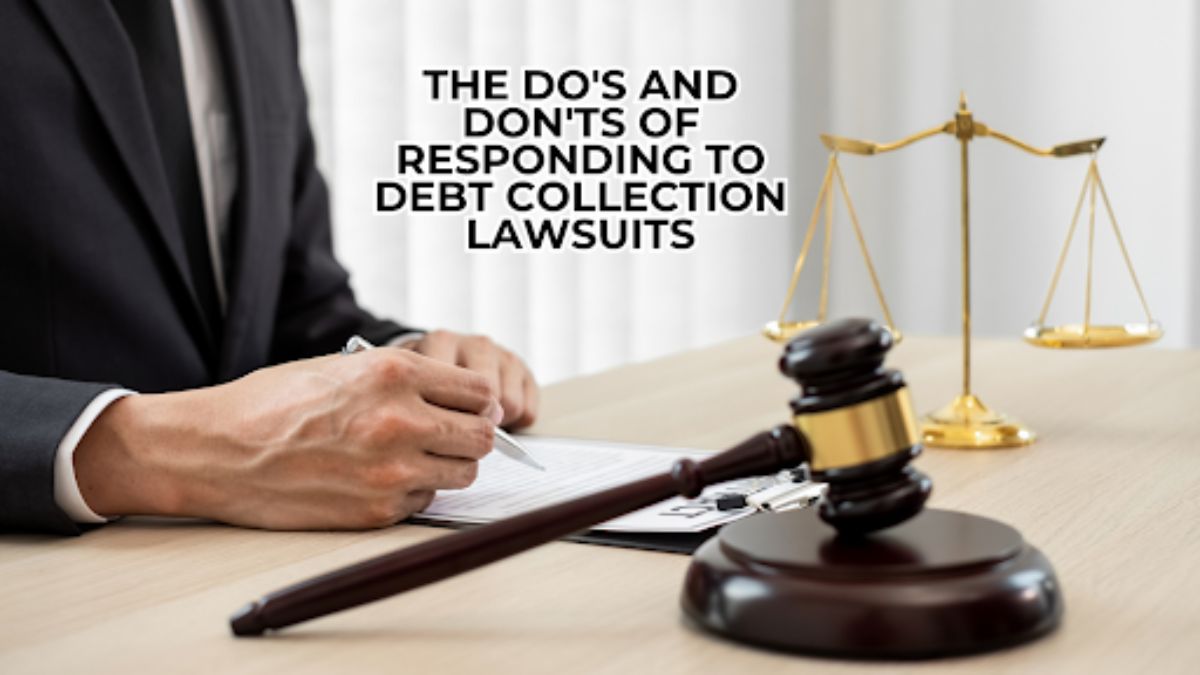LAW
The Do’s and Don’ts of Responding to Debt Collection Lawsuits

Have you just been served with a debt collection lawsuit and don’t know what to do next? The good news is that you have rights and how you respond can make all the difference. Ignoring it can lead to serious financial consequences, but taking the right steps can protect you.
This blog walks you through the do’s and don’ts of handling debt lawsuits, including how to respond to court papers, challenge debt ownership, and avoid costly mistakes that could put your finances at risk.
Understanding the Basics of Debt Collection Lawsuits
When a debt goes unpaid, creditors often turn to the legal system to collect. The debt collection industry works through various channels before pursuing lawsuits. Many debt buyers and collection agencies, velocity investments, acquire and manage consumer debt portfolios through the court system when other collection attempts fail.
Court summons require careful attention and proper response within strict deadlines. Missing these crucial windows can result in automatic judgments against defendants, leading to wage garnishment or bank account levies.
Top 5 Do’s for Handling Collection Lawsuits
- Document Everything
It’s crucial to keep copies of every piece of paper that comes regarding the debt, including bills, letters, or legal notices. Additionally, make sure to write down the names, badge numbers, and details of every person you speak with over the phone. Tracking the dates and times of all communication will help you keep an accurate record of everything that happens, which can be useful if you need to contest anything later.
- Meet Court Deadlines
Courts issue strict deadlines for responding to a lawsuit, and if you miss them, you may automatically lose the case. It’s essential to read the court papers immediately to identify any important dates and ensure you don’t miss anything. Meeting these deadlines allows you to defend yourself properly in court and possibly avoid an unfavorable outcome.
- Challenge Debt Ownership
When facing a debt collection lawsuit, make the collection agency prove they own the debt in question. Many debt buyers cannot provide adequate documentation showing they purchased the debt from the original creditor. By asking for proof of ownership, you may uncover flaws in the collector’s case, which can help you challenge the validity of the debt.
- Get Everything in Writing
It’s important not to rely on verbal promises made by debt collectors over the phone. Always request that any agreements or arrangements be sent to you in writing through the mail. Written agreements are legally binding and provide you with a record of what was promised, which can protect you in case of future disputes.
- Keep Proof of Payments
Save all receipts, bank statements, or other forms of proof that show you’ve made payments toward the debt. If you send payments via money orders, take pictures of the receipts before sending them. Having clear records of your payments ensures that debt collectors cannot falsely claim that you’ve missed payments or owe more than you do.
Top 5 Don’ts When Facing Collections
- Don’t Ignore Court Papers
Failure to acknowledge court papers together with the behavior of pretending their existence does not matter leads the situation toward more trouble. Non-response to legal documentation enables the debt collector to gain additional control thus leading to possibly obtaining a judgment against you. Serious legal issues arise from ignoring court papers because you secure your rights and build the chance to defend yourself against the lawsuit.
- Don’t Make Verbal Agreement
Any phone-based agreement between you and debt collectors becomes official only if you have written confirmation from them. You risk unknown problems when agreeing to terms by phone because a lack of written records can create confusion about your rights at later times. Seek written proof for all agreements the collectors offer so you can validate the promises they make.
- Don’t Give Bank Information
You must protect your bank information as well as details about your employer since providing them to debt collectors can lead to risks. While disclosing this information to collectors provides them control over your funds they may use it to initiate garnishment actions and unauthorized fund transfers. Financial details need to remain secret until receiving a court mandate for disclosure.
- Don’t Make Partial Payments
Modern experts confirm that paying small amounts for old debts could result in unexpected negative consequences. A minimal debt payment restarts the time you have to respond to prosecution under the statute of limitations enabling debt collectors to bring another lawsuit against you. Ensure thorough evaluation of payment options before giving any money to understand their effect on current case proceedings.
- Don’t Face It Alone
Attempting debt collection lawsuit cases on your own results in increased stress and develops expensive errors. Free legal support together with financial resources exists for debt-related issues through various organizations. Working with professionals at the beginning allows you to develop sound choices that prevent both monetary stress and mental strain.
Responding to Court Papers
Reading court documents carefully reveals important details about the debt and collector’s claims. Every paragraph in the complaint needs a specific response – admit, deny, or state lack of knowledge. Missing even one point could hurt your case later.
Court papers include strict deadlines that matter more than most people realize. Filing an answer with the court puts collectors on notice that they must prove their case. Written responses create an official record protecting your rights throughout the process.
Types of Debt Collection Responses
| Response Type | Pros | Cons | Impact |
| Written Answer | Creates legal record | Requires careful wording | Preserves rights |
| Default | No immediate effort | Loses case automatically | Worst outcome |
| Settlement | Resolves quickly | May need a lump sum | Ends collection |
| Challenge | Questions debt validity | Takes more time | May dismiss case |
Documentation Requirements
Keeping organized records makes responding to collectors much easier. Save every letter, email, and court paper in a dedicated folder or digital file. Good records often reveal collector mistakes that help your case.
Smart record-keeping includes noting dates, times, and details of every collector contact. Written proof of what happened protects against collector claims that might not be true. These records become valuable evidence if the case goes to court.
Seeking Professional Help
Seeking advice from a lawyer at the correct time leads to financial savings throughout the process. Free legal clinics together with consumer protection organizations provide support to those dealing with collection lawsuits. Professional help obtained at the beginning of a case ensures homeowners do not pay excessive expenses because of incorrect choices.
Lawyers specializing in debt collection defense stay aware of all the tactics collectors apply during their cases. Once consultation takes place it allows people to comprehend their available choices more clearly. The first assessment of legal cases by attorneys often comes at no cost to clients.
Conclusion
A debt lawsuit mandated appropriate action together with knowledge enhances your right to defense and safeguards your financial security. The right approach combined with legal understanding enhances your probability of obtaining an equitable resolution of your case. When faced with a collection lawsuit you must not fail to act because ignoring it leads to default judgments yet responding appropriately can protect your rights and yield a potentially favorable result.
Frequently Asked Questions
What happens if someone ignores a debt collection lawsuit?
If you ignore a debt collection lawsuit, the court may issue a default judgment against you, meaning you lose the case automatically. This gives the debt collectors the legal right to take more aggressive actions, such as garnishing your wages or freezing your bank accounts to collect the debt.
Can old debts still be collected through lawsuits?
Yes, old debts can still be pursued through lawsuits, but each state has specific time limits known as the statute of limitations. Despite these time limits, debt collectors sometimes file lawsuits hoping that people won’t be aware of their rights or the expiration of the statute of limitations.
Does answering a lawsuit mean admitting the debt?
No, responding to a lawsuit does not mean you are admitting to owing the debt. By filing an answer, you are simply preserving your right to contest the debt and defending yourself by court procedures.
LAW
Family Law Basics: Key Issues and Solutions

Family law touches nearly every aspect of our most personal relationships, including marriage, separation, child custody, and financial arrangements after a separation. Understanding the foundations of family law can make navigating these highly emotional and complex issues less overwhelming and far more manageable. Many individuals facing family legal challenges turn to a family attorney Tampa for experienced legal support and guidance, especially when outcomes can significantly impact their families’ futures.
From creating legal unions to resolving child custody disputes, family law is designed to both protect and provide clarity for all parties involved. Whether you are preparing for marriage, facing divorce, or seeking a protective order, having a clear understanding of your rights and obligations is crucial. This knowledge not only empowers you to make informed decisions but also helps ensure that your family’s well-being remains the top priority in any legal process. With laws and regulations differing from state to state, staying informed and seeking timely legal counsel is often a wise first step.
Marriage and Legal Unions
Getting married is not only a significant emotional milestone, but it also constitutes a legal contract between two individuals. Family law regulates the process of legal unions, setting the requirements for age, consent, and state-specific documentation. Once married, both partners acquire certain legal rights and responsibilities, encompassing joint property rights, financial duties, healthcare decisions, and inheritance arrangements. These legal dimensions make marriage more than a personal promise; it’s a legal status that carries essential consequences.
Understanding the legal prerequisites for marriage, such as blood tests (in some states), license applications, and waiting periods, can be essential for couples planning to wed. Entering marriage with a solid knowledge of these requirements helps lay a strong legal and relational foundation.
Divorce and Legal Separation
Divorce marks the legal end of a marriage and can be a complex process involving emotional, financial, and logistical hurdles. States generally recognize two main approaches: no-fault divorce, which doesn’t require proof of wrongdoing, and fault-based divorce, which requires grounds such as abuse or infidelity. Divorce settlements typically encompass asset division, debt allocation, child custody arrangements, and ongoing support agreements.
Legal separation, an alternative for couples not ready for divorce, allows for the division of property and parental responsibilities while the marriage remains legally intact. This can provide a middle ground for couples grappling with reconciliation or religious reasons for avoiding divorce.
Child Custody and Visitation
When children are involved, custody arrangements become a critical aspect of family law. Courts make custody and visitation decisions with the child’s best interests in mind, considering factors like each parent’s stability, parenting ability, and the wishes of older children. There are several types of custody—legal, physical, joint, or sole—depending on the circumstances.
Visitation rights ensure that both parents can continue to be involved in their child’s life. Modern courts increasingly value maintaining meaningful relationships with both parents unless doing so would endanger the child’s safety or well-being.
Child Support and Alimony
Ensuring children have access to the resources they need is at the heart of child support law. Child support payments are designed to cover basic needs, such as housing, food, and healthcare, and may also include expenses for education and extracurricular activities. The calculation of support obligations typically considers parental income, custody arrangements, and the child’s specific needs.
FindLaw’s guide to child support provides a detailed overview of the process, including calculation methods and enforcement procedures.
Alimony, also known as spousal support, may be awarded when one spouse requires assistance in becoming financially independent after divorce. Courts weigh factors such as the length of marriage, earning potential, and each party’s contributions when determining if and how much alimony is paid.
Property Division
In a divorce, marital property (assets accumulated during the marriage) must be divided. Most states follow the principle of “equitable distribution,” aiming for a fair—though not necessarily equal—split based on the partnership and individual needs. Factors considered may include the duration of the marriage, both spouses’ contributions, and future financial prospects.
Debts incurred during the marriage—like mortgages or loans—are divided alongside assets. Understanding what qualifies as marital vs. separate property can help prevent conflicts during the legal process.
Adoption and Guardianship
Adoption provides a legal framework for individuals to become the lawful parents of a child who isn’t biologically theirs. The process is thorough, including background checks, home studies, and court hearings to ensure the child’s welfare. Adoption can be domestic, international, or through foster care systems.
Guardianship provides an alternative legal arrangement, enabling individuals to care for a child without relinquishing parental rights. It’s often used in cases where parents are unable to care for their child temporarily but wish to maintain their legal relationship.
Domestic Violence and Protective Orders
Protecting family members from harm is a vital function of family law. Victims of domestic violence can seek protective (or restraining) orders, which legally prevent abusers from contacting or approaching the victim. Courts act quickly to ensure safety, sometimes issuing immediate orders before a full hearing has taken place.
Support organizations and the National Domestic Violence Hotline provide essential resources and safety planning for individuals in abusive situations. Legal tools and community resources together play a crucial part in preventing harm and facilitating recovery.
Prenuptial and Postnuptial Agreements
Prenuptial and postnuptial agreements outline how future disputes over property and debts should be resolved in the event of divorce or death. These legally binding documents clarify expectations, prevent misunderstandings, and protect assets such as family businesses, inheritances, or premarital property.
While discussing such agreements can be sensitive, they often help foster transparency and trust by addressing financial matters before potential issues arise.
Family law encompasses a wide range of deeply personal issues, but receiving timely and knowledgeable legal guidance can provide clarity and peace of mind. By educating yourself about your rights and obligations, and considering experienced legal help when necessary, you can ensure that your interests and your family’s well-being are protected throughout every step of the process.
LAW
Defense Attorney Near Me

You may find yourself searching for a defense attorney near me during times of stress or uncertainty. When facing legal challenges, having the right defense attorney by your side is crucial. They stand as your guide, offering strong support and clear advice. This decision is not just about location. It’s about choosing someone who listens, understands, and fights for you. A nearby defense attorney often offers more than convenience. They can provide local insight and quick response times. You deserve to feel confident and secure knowing you have a dedicated professional in your corner. You want someone who understands the weight of your situation and is ready to take immediate action. Navigating the legal world can be overwhelming, but with a trusted defense attorney nearby, you are not alone. They will walk with you, ensuring that your rights are protected and your voice is heard.
Understanding the Role of a Defense Attorney
A defense attorney is your legal protector. They represent you in criminal cases, working tirelessly to ensure your side of the story is heard. Their responsibilities include gathering evidence, interviewing witnesses, and crafting a strong legal strategy. This role demands not only legal skills but also empathy and dedication. Your attorney serves as both an advocate and a counselor, guiding you through complex legal processes. According to the United States Courts, understanding your rights and the intricacies of the legal system can significantly impact the outcome of your case. By selecting an attorney who is both skilled and compassionate, you set the stage for the best possible defense. For more detailed information on criminal laws and penalties, visit the Law Office of Michael Stefanos.
Why Local Matters
Choosing a “defense attorney near me” is more than a matter of convenience. Local attorneys bring an understanding of regional laws and court systems, which can be invaluable. They often have established relationships within local legal circles, which can facilitate more effective communication and negotiation. Being nearby allows them to dedicate more time to your case, offering the advantage of immediacy in actions and decisions. Furthermore, their proximity often translates to better availability for meetings and court appearances. This local advantage can be crucial in developing a tailored defense strategy that considers all aspects of your case.
Factors to Consider When Choosing a Defense Attorney
When selecting a defense attorney, consider these key factors:
- Experience: Look for an attorney with a proven track record in similar cases.
- Communication: Ensure they communicate clearly and are available to answer your questions.
- Reputation: Research online reviews and seek recommendations from trusted sources.
Choosing the right attorney can profoundly affect your case’s outcome. For help with finding a lawyer, you might consult resources like the American Bar Association.
Potential Costs Involved
Understanding the potential costs involved in hiring a defense attorney is essential. Legal fees can vary widely based on experience, case complexity, and location. Here’s a simple comparison to help you understand general expectations:
| Service | Average Cost |
|---|---|
| Initial Consultation | Free to $300 |
| Hourly Rate | $150 to $700 |
| Flat Fee for Misdemeanor | $1,000 to $3,000 |
| Flat Fee for Felony | $3,000 to $10,000+ |
Discuss cost structures with potential attorneys upfront. Ask about any additional fees and understand what services are included.
The Importance of Trust
Trust is the foundation of any attorney-client relationship. You should feel comfortable sharing sensitive information with your attorney. If you feel unsure or uneasy, it may be wise to continue your search. An attorney who listens and responds with understanding helps build the trust necessary for a collaborative relationship. This trust will be crucial as you work together to build a defense that aligns with your needs and expectations.
Final Thoughts
Facing legal challenges is never easy. However, with a “defense attorney near me,” you gain a partner who understands the legal landscape and is committed to your defense. Whether you’re navigating a minor issue or a more serious charge, the right attorney provides the guidance and support you need. Take the time to research and choose someone who aligns with your values and needs. Doing so can significantly influence the journey ahead, offering peace of mind and a positive impact on your case’s outcome.
LAW
What To Do If Your Ex Stops Paying Court Ordered Support

Dealing with the sudden halt of court-ordered support can shake your stability. Whether it’s child support or spousal maintenance, you’re left wondering how to manage. Immediate action is needed to address this issue. You are not alone in facing this challenge. Many encounter this roadblock, and there are clear steps to follow. First, understand the factors that influence support payments. You may ask, “What is alimony?” Alimony is financial support from one ex-spouse to another post-divorce. It ensures financial fairness and continuity. When these payments stop, it disrupts your planned financial security. Start by reviewing your court order. Check the specifics of the payment terms. Confirm whether the non-payment was accidental or intentional. If intentional, the next step is to contact the legal system. Your local courthouse or legal aid organization can guide you. Remember, time is critical. Addressing the situation swiftly helps secure your financial future.
Steps to Take
When your ex stops paying, follow these steps. First, examine the court order. This order lists the payment amount and schedule. Make sure you know these details. If there is a misunderstanding, clarify it with your ex. Communication might solve the issue quickly.
Next, gather evidence of missed payments. Collect bank statements or payment records. These documents are crucial if you need to take legal action. Then, contact a legal professional or family law advisor. They can offer guidance. Legal aid offices often provide assistance at low or no cost. Access more information about legal aid through Legal Services Corporation.
Contact the Court
If payments do not resume, you may need court intervention. File a complaint about non-payment. The court can enforce the original order. Possible actions include wage garnishment or contempt of court charges. The court’s involvement signals seriousness and often prompts payment. Understand that court procedures can vary by location. Ensure you follow the correct process by consulting your courthouse.
Options for Support Enforcement
Various enforcement options exist. Wage garnishment involves automatically deducting payments from wages. Seizing tax refunds is another possibility. The court might also impose fines or suspend licenses. These measures encourage compliance with orders.
Comparison of Enforcement Options
| Enforcement Option | Action Taken | Effectiveness |
|---|---|---|
| Wage Garnishment | Directly deducts payment from wages | Highly effective |
| Seizing Tax Refunds | Redirects tax refunds | Effective |
| Suspending Licenses | Revokes driving or professional licenses | Moderately effective |
| Fines and Penalties | Imposes additional financial penalties | Moderately effective |
Seek Mediation
Mediation might be a viable option. It offers a neutral ground for discussion. Mediators help each party reach an agreement. This path often resolves conflicts without court involvement. Resources for mediation can be found at local family courts or community centers.
Consider Long-term Solutions
Think about the long-term financial impact. Adjust your budget to account for missed support. Explore financial planning resources. Consider job training or education programs to increase earnings. Your stability is a priority.
Conclusion
When your ex stops paying court-ordered support, it creates stress. Yet, you have options to regain control. Start with understanding, communication, and documentation. Then, move to legal avenues if necessary. Consider mediation for peaceful resolution. Finally, secure your financial future by planning for changes. Take these steps to empower yourself and ensure your family’s wellbeing.
-

 FASHION12 months ago
FASHION12 months agoTop Kids Clothing Trends for 2025 – What’s In Style This Year?
-

 FASHION1 year ago
FASHION1 year agoElegant Winter Party Style: Trendy Long-Sleeve Dresses and Essential Hair Care Tips
-

 HOME12 months ago
HOME12 months agoWeather Related Event Closings Explained
-

 AUTOMOTIVE1 year ago
AUTOMOTIVE1 year agoMitsubishi Pajero 3.0 V6 – Specs, Performance & Guide
-

 HOME1 year ago
HOME1 year agoExploring the World of TG Tube: A Comprehensive Guide
-

 BUSINESS1 year ago
BUSINESS1 year agoHOW TO SHOP GOODWILL OUTLET STORE
-

 HOME12 months ago
HOME12 months agoTributePrintedPics Review: A Deep Dive into Quality, Design, and Customer Experience
-

 EDUCATION12 months ago
EDUCATION12 months agoCan You Wear a Different Coloured Contact Lens in Each Eye? The Science Behind Mismatched Vision
